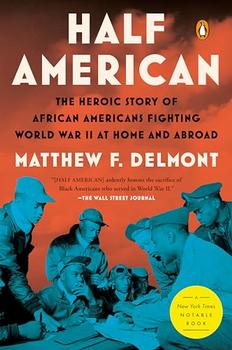Summary | Excerpt | Reviews | Beyond the Book | Readalikes | Genres & Themes | Author Bio

The Epic Story of African Americans Fighting World War II at Home and Abroad
by Matthew DelmontINTRODUCTION
Shortly after the attack on Pearl Harbor in December 1941, James Gratz Thompson, a twenty‑six‑year‑old Black cafeteria worker from Wichita, could not sleep. He had registered with the Selective Service the prior year, and now, with the U.S. declaring war on Japan and Germany, it was only a matter of time before he'd be drafted. The prospect of war was frightening for many civilians, but something else was on his mind on that cold Kansas night. Sitting in his family's home, in a vibrant Black neighborhood amid a segregated American city, Thompson wrote a letter to the editor of the Pittsburgh Courier, the nation's largest Black newspaper, expressing the concerns that he and many other Black Americans felt about joining a racially segregated military.
"Should I sacrifice my life to live half American?" Thompson asked. "Will things be better for the next generation in the peace to follow? Would it be demanding too much to demand full citizenship rights in exchange for the sacrificing of my life? Is the kind of America I know worth defending?"
Thompson's poignant questions about patriotism had an immediate impact. Hundreds of thousands of Black Americans read his letter printed in the pages of the Courier. The influential newspaper used the letter to launch the Double Victory campaign, with the aim of securing victory over fascism abroad and victory over racism at home. The Courier ran hundreds of stories, photographs, and cartoons to support this initiative. Double V clubs formed in communities across the country, and civil rights activists touted the slogan.
I have taught about World War II for more than a decade, but researching this book has forced me to see the war with fresh eyes. Taking the twin aims of the Double V campaign seriously—victory over fascism abroad and victory over racism at home—it is clear that the United States did not achieve a full victory in World War II. Although the Nazis were conquered on the battlefield, the racial ideas of white supremacy continued to flourish in America—then and today.
Half American aims to tell the definitive history of Black Americans and World War II. Nearly everything about the war—the start and end dates, geography, vital military roles, home front, and international implications—looks different when viewed from the African American perspective. For Black Americans, the war started not with Pearl Harbor in 1941 but several years earlier with the Italian invasion of Ethiopia and the Spanish Civil War. As soon as Adolf Hitler's regime rose to power in the 1930s, Black Americans recognized the significance of the Nazi threat and the similarities between the Third Reich's and America's racial policies. In the pages of newspapers and in activist refrains, Blacks argued that Nazi racial ideology was not solely a foreign problem. Describing a plan to segregate Jews on German railways, the New York Amsterdam News wrote that Nazis were "taking a leaf from the United States Jim Crow practices." The Chicago Defender noted that "the practice of jim‑crowism has already been adopted by the Nazis" and proceeded to quote from the official newspaper of the SS, the Nazi paramilitary organization, on the American origins of Germany's railway ban on Jews.
In the days after Pearl Harbor, hundreds of Black volunteers were turned away by military recruiters. In a nation mobilizing for war, African Americans first had to fight for the right to serve in the military. Ultimately, over one million Black men and women served in World War II and hundreds of thousands worked in defense industries at home. The trailblazing Tuskegee Airmen, 92nd Infantry Division, Montford Point Marines, and 761st "Black Panther" Tank Battalion served bravely in combat, and Black troops shed blood in the iconic battles at Normandy and Iwo Jima, and in the Battle of the Bulge. Most Black troops, however, labored in unheralded but vital support jobs. Black newspapers highlighted the important roles these men and women played in lesser‑known battles and war zones around the world, from New Guinea to Alaska, and from the Mediterranean island of Pantelleria to the mountains of the China‑Burma‑India theater.
From Half American by Matthew F. Delmont, published by Viking, an imprint of the Penguin Publishing Group, a division of Penguin Random House LLC. Copyright © 2022 by Matthew F. Delmont.
https://www.penguinrandomhouse.com/books/624655/half-american-by-matthew-f-delmont/




From the moment I picked your book up...
Click Here to find out who said this, as well as discovering other famous literary quotes!
Your guide toexceptional books
BookBrowse seeks out and recommends the best in contemporary fiction and nonfiction—books that not only engage and entertain but also deepen our understanding of ourselves and the world around us.